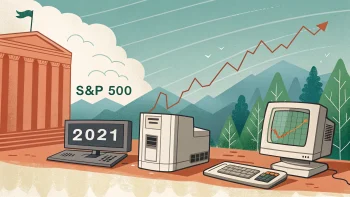The Federal Reserve, the central banking system of the United States, recently concluded a meeting that has sent shockwaves through the financial markets. The outcome of this meeting has had a significant impact on various investment sectors, with some investors reaping substantial benefits while others have been left in the dust.
The Federal Reserve’s decision not to alter interest rates was a significant announcement. However, the real bombshell was their projection that they expect to cut rates three times this year. This is a significant shift in monetary policy that could have far-reaching implications for the economy and financial markets.
View this post on Instagram
A post shared by Taylor Sohns – CFP®, CIMA®, MBA – Finance (@lifegoalinvestments)
Table of Contents
ToggleForecasting the future of the U.S. economy
The Federal Reserve’s announcement was not just about interest rates. They also made a bold prediction about the future of the U.S. economy. They expect the economy to grow 50% more than projected in December. This is a massive increase in economic strength, which has sent a wave of optimism through the financial markets.
Immediate impact on the financial markets
The impact of the Federal Reserve’s announcement was immediate and widespread. Stocks, bonds, gold, and alternative investments all exploded higher in value. This clearly indicates investors’ confidence in the future of the U.S. economy. The expectation of a robust economy and the prospect of lower interest rates has created a perfect storm for investment growth.
The downside for cash holders
However, not all investors have benefited from the Federal Reserve’s announcement. Those sitting on cash, money markets, and CDs have been left out in the cold. For the past 18 months, there have been warnings about the dangers of holding onto cash in a growing economy. The recent surge in the value of various investments has only served to highlight the missed opportunities for those who have chosen to remain in cash.
Recession fears and missed opportunities
The fear of a recession has been a significant factor in some investors’ decision to stay in cash. However, this fear may be misplaced. Over the past 18 months, many have predicted an imminent recession, but these predictions have not come to fruition. Instead, the economy has continued to grow, and those who have stayed in cash have missed out on a 40% run in stocks.
Managing risks with a diversified investment strategy
This is not to say that investing in stocks is without risk. However, the risks can be mitigated through a diversified investment strategy. By complementing stocks with bonds and alternative investments, investors can protect themselves against potential downturns in the stock market. For example, during the massive recession of 2008, the 10-year treasury bond was up 20%.
Creating a risk-aware portfolio
Creating a diversified, risk-aware portfolio is crucial for investors looking to move out of cash and take advantage of the growing economy. This involves carefully balancing various types of investments, each with its own risks and rewards. It requires a deep understanding of the financial markets and adapting to changing economic conditions.
Conclusion: seizing opportunities in a robust economy
In conclusion, the Federal Reserve’s recent announcement has significantly impacted the economy and financial markets. While some investors have been left behind, others have reaped the benefits of a growing economy and the prospect of lower interest rates. A diversified, risk-aware investment strategy is the key to success in this environment. By moving out of cash and into a mix of stocks, bonds, and alternative investments, investors can position themselves to take advantage of the opportunities a robust economy presents.
Frequently Asked Questions
Q. What was the Federal Reserve’s recent announcement?
The Federal Reserve recently announced that they will not be altering interest rates. However, they also projected that they expect to cut rates three times this year. This significant shift in monetary policy could have far-reaching implications for the economy and financial markets.
Q. What is the Federal Reserve’s prediction for the future of the U.S. economy?
The Federal Reserve expects the U.S. economy to grow 50% more than it projected in December. This massive increase in economic strength has sent a wave of optimism through the financial markets.
Q. How did the financial markets react to the Federal Reserve’s announcement?
The Federal Reserve’s announcement had immediate and widespread impact. Stocks, bonds, gold, and alternative investments all exploded in value, a clear indication of investors’ confidence in the future of the U.S. economy.
Q. What is the downside for cash holders?
Those sitting on cash, money markets, and CDs have been left out in the cold. The recent surge in the value of various investments has only highlighted the missed opportunities for those who have chosen to remain in cash.
Q. How can investors manage risks?
Investors can manage risks through a diversified investment strategy. By complementing stocks with bonds and alternative investments, investors can protect themselves against potential downturns in the stock market.
Q. What is a risk-aware portfolio?
A risk-aware portfolio is a diversified portfolio that balances various types of investments, each with its own risks and rewards. It requires a deep understanding of the financial markets and adapting to changing economic conditions.
Q. How can investors seize opportunities in a robust economy?
Investors can seize opportunities in a robust economy by moving out of cash and into a mix of stocks, bonds, and alternative investments. This allows them to take advantage of the opportunities a growing economy presents and the prospect of lower interest rates.

















